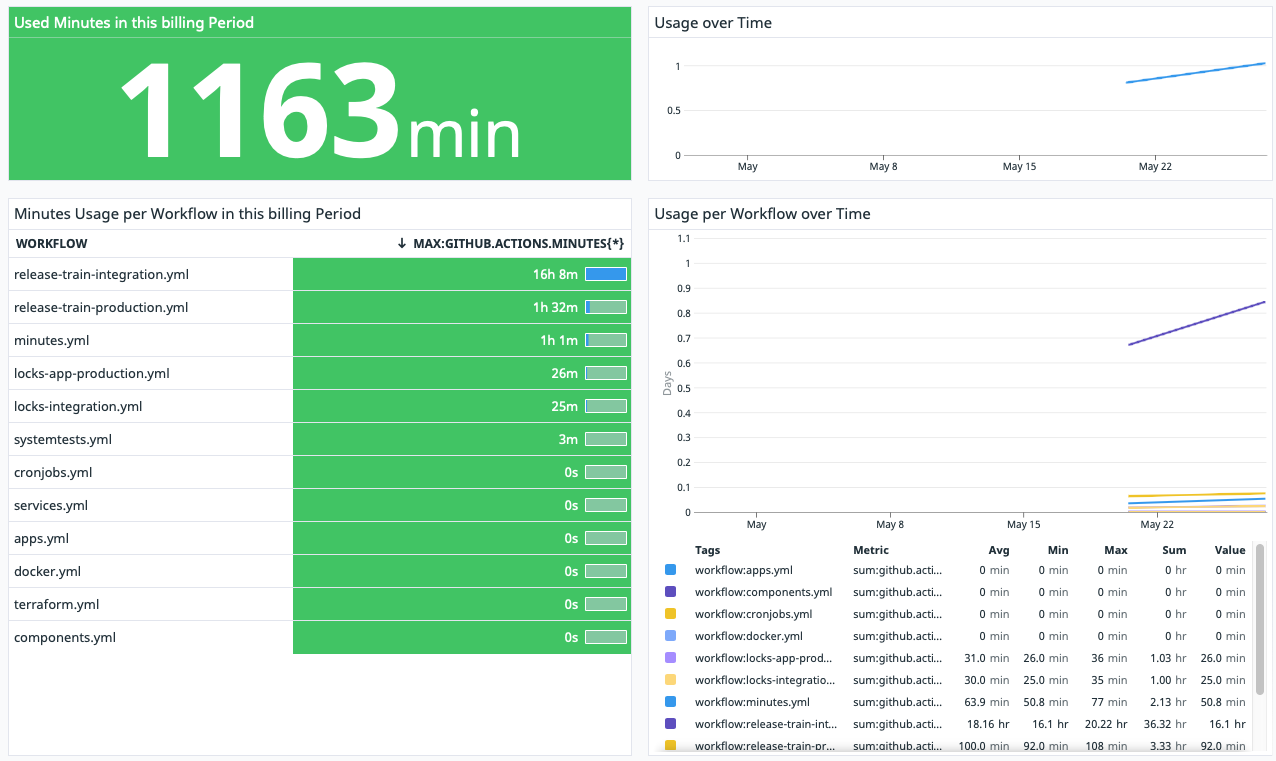GitHub Action for Monitoring Workflow Billing with Custom Metrics in Datadog
Some time ago, I crafted a GitHub Actions for a custom Datadog metric to meticulously monitor GitHub minutes usage for a substantial project. The primary objective was to gain a precise understanding of how many minutes per workflow were consumed within the billing period, enabling us to pinpoint areas for improvement. The workflow triggers a GitHub API call to fetch the current billing minutes for the workflow. Subsequently, this value undergoes conversion and is transmitted to the Datadog API. The outcome? You can elegantly display it, perhaps as a time series or table, showcasing the total usage throughout the ongoing billing cycle.
Here’s the YAML action configuration:
name: Workflow Usage Datadog Custom Metric
author: Domenic Gosein
description: GitHub Action to send minutes usage per workflow to a custom metric in Datadog.
branding:
icon: 'clock'
color: 'orange'
inputs:
api_key:
description: 'Datadog API key e.g. from GitHub Actions Secrets'
required: true
app_key:
description: 'Datadog Application Key e.g. from GitHub Actions Secrets.'
required: true
repo_path:
description: 'Repository path e.g. from standard variable.'
required: true
wf:
description: 'Workflow name from strategy matrix.'
required: true
tag_workflow_id:
description: 'Workflow name from strategy matrix.'
required: true
github_tk:
description: 'Github Actions Token from GitHub Actions Secrets.'
required: true
runs:
using: 'composite'
steps:
- name: Get latest timing trough GitHub API request
uses: octokit/request-action@v2.1.0
id: get_latest_timing
with:
route: GET /repos/$/actions/workflows/$/timing
env:
GITHUB_TOKEN: $
- name: Value check received from API request
shell: bash
run: echo $
- name: Calculate and post latest timing in minutes to Datatdog as a Custom Metric
shell: bash
id: post_latest_timing
run: |
min=$(($latest_total_ms_ubuntu / 60000))
echo $min
export NOW="$(date +%s)"
curl -X POST "https://api.datadoghq.eu/api/v1/series" \
-H "Content-Type: text/json" \
-H "DD-API-KEY: $DD_API_KEY" \
-d @- << EOF
{
"series": [
{
"metric": "github.actions.minutes",
"points": [[${NOW}, $min]],
"tags": "workflow:$tag_workflow_id",
"type": "gauge"
}
]
}
EOF
env:
DD_API_KEY: $
DD_APP_KEY: $
latest_total_ms_ubuntu: $
tag_workflow_id: $
And here’s an exemplary configuration where workflows are defined in a matrix:
on:
workflow_run:
workflows: [Worfklow One, Workflow Two] # Runs when one of the workflow defined in the brackets is run and completed
types:
- completed
schedule:
- cron: 30 23 * * 1,3,5 # At 23:30 on Monday, Wednesday, and Friday
workflow_dispatch:
jobs:
updateWorkflowTimings:
runs-on: ubuntu-latest
strategy:
matrix:
WFs: [workflow_one.yml, workflow_two.yml] # Runs for each workflow defined in the brackets
steps:
- name: Use my action
uses: goseind/datadog-gh-actions@v1.0.0
with:
api_key: $
app_key: $
repo_path: $
tag_workflow_id: $
wf: $
github_tk: $
This is how it would manifest in a Datadog Notebook with a neat visualization of the GitHub actions minutes:
